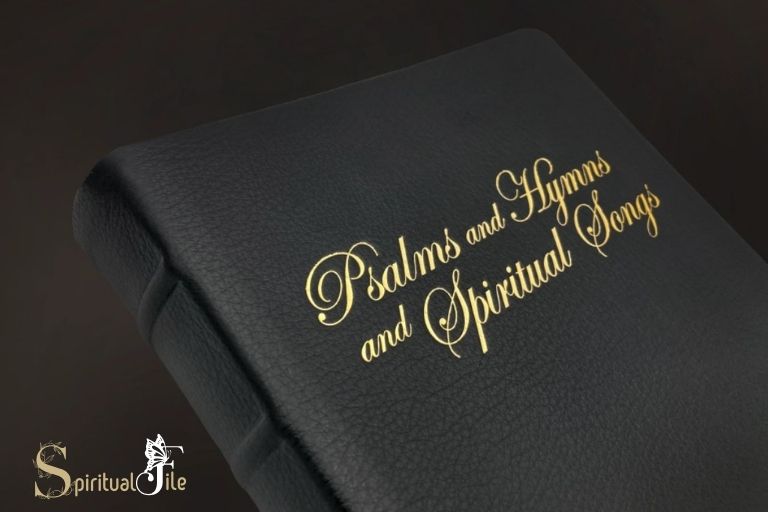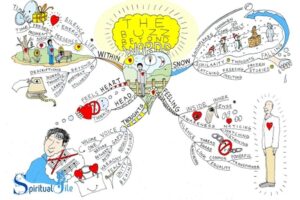Examples of Psalms Hymns And Spiritual Songs? Worship!
Psalms, hymns, and spiritual songs are different types of songs used in the worship of God. Examples of psalms include Psalm 23, Psalm 150, and Psalm 100.
Hymns are traditional songs of praise, such as “Amazing Grace” and “How Great Thou Art.” Spiritual songs often refer to contemporary worship songs like “10,000 Reasons” and “Oceans.”
Psalms are a collection of sacred poems from the Bible, traditionally attributed to King David. They are set to music for worship in many religions. Hymns are a type of song, typically of praise to God, used in Christian worship.
They are often traditional and have a formal structure. Spiritual songs, on the other hand, are more contemporary and may not follow a formal structure. They are often personal and emotive expressions of faith.
Psalms, hymns, and spiritual songs each have a unique place in religious worship. Psalms offer a direct link to the biblical text and allow worshippers to connect with the words of King David.
Hymns provide a sense of tradition and formal worship, often drawing on centuries of religious history. Spiritual songs, being more contemporary, often resonate with younger generations and provide a more personal expression of faith.
3 Types of Psalms, Hymns, and Spiritual Songs Examples
| Type | Example |
|---|---|
| Psalms | Psalm 23: The Lord is my shepherd; I shall not want. He maketh me to lie down in green pastures: he leadeth me beside the still waters. |
| Hymns | Amazing Grace: Amazing grace, how sweet the sound, That saved a wretch like me. I once was lost, but now am found, Was blind, but now I see. |
| Spiritual Songs | Swing Low, Sweet Chariot: Swing low, sweet chariot, Coming for to carry me home; Swing low, sweet chariot, Coming for to carry me home. |
Key Takeaway

Five Facts About Psalms Hymns And Spiritual Songs
Understanding The Purpose Of Worship
Understanding the purpose of worship involves delving into the examples of psalms, hymns, and spiritual songs. These expressions of faith provide a platform for believers to connect with the divine and express their devotion.
Role Of Music In Spiritual Expression
Music plays a vital role in spiritual expression, providing a powerful medium to connect with the divine.
Here are some key aspects of the role of music in worship:
Music as a form of praise: Psalms, hymns, and spiritual songs are used to express adoration, gratitude, and devotion to god. Through melodic and lyrical expressions, believers honor and glorify their faith.
Music as a means of communication: Sometimes, words alone are insufficient for conveying the depth of one’s spirituality. Music bridges this gap, allowing believers to express their innermost thoughts, feelings, and experiences in a profound and meaningful way.
Music as a unifying force: Singing together creates a sense of unity and shared purpose among worshippers. Regardless of individual differences, music brings believers together, fostering a collective experience of worship.
Music as a spiritual guide: The power of music lies in its ability to evoke emotions, create an atmosphere of reverence, and uplift one’s spirit. It has the potential to inspire, comfort, and guide individuals on their spiritual journey.
Music in worship serves as a form of praise, a means of communication, a unifying force, and a spiritual guide, enhancing the overall worship experience.
Historical Significance Of Psalms, Hymns, And Spiritual Songs
Psalms, hymns, and spiritual songs have a rich historical significance, deeply rooted in religious traditions.
Here are some key points highlighting their historical importance:
Ancient origins: Psalms, which are a part of the biblical book of psalms, were written and used in worship as early as the time of king david. Their historical significance can be traced back thousands of years.
Hymns in religious traditions: Hymns have long been used in various religious traditions as a way to express devotion and connect with the divine. These songs have evolved over time and reflect the cultural and spiritual practices of different eras.
Spiritual songs in african american culture: Spiritual songs have a significant historical relevance in african american culture, particularly in the context of slavery and the civil rights movement.
These songs served as expressions of faith, hope, and resilience in the face of adversity.
Influence on music composition: Psalms, hymns, and spiritual songs have had a profound impact on music composition throughout history.
Many great composers, including johann sebastian bach and handel, have drawn inspiration from these sacred texts, creating timeless musical masterpieces.
Understanding the historical significance of psalms, hymns, and spiritual songs not only provides insight into their cultural and religious context but also enhances our appreciation for their enduring beauty and spiritual power.
The role of music in spiritual expression encompasses praise, communication, unity, and guidance.
The historical significance of psalms, hymns, and spiritual songs adds depth and meaning to their use in worship.
Together, they create a rich tapestry of devotion, connecting believers to their faith and to one another as they express their spirituality through music.
Examples Of Psalms
Psalms offer a wealth of examples for hymns and spiritual songs, showcasing the rich heritage of religious poetry and music.
With their poetic language and heartfelt expressions, these examples provide inspiration for both personal devotion and communal worship.
The Poetic Beauty Of Psalms
Psalms are a collection of poetic worship and praise songs found in the book of psalms in the bible. They offer a beautiful expression of human emotions, from joy and thanksgiving to despair and lamentation.
Here are some aspects that make psalms so enchanting:
- Rich metaphors and imagery: Psalms are filled with vivid descriptions and powerful imagery that engage the reader’s senses. They use metaphors drawn from nature, everyday life, and the experiences of the psalmist, creating a vibrant tapestry of words and emotions.
- Poetic structures: Psalms often employ poetic devices such as parallelism, repetition, and chiasmus, enhancing their beauty and rhythm. This artistic structure adds depth and resonance to the messages conveyed by the psalmist.
- Universal themes: Despite being thousands of years old, the themes explored in the psalms are timeless and relatable. They touch on topics like trust in god, protection, guidance, and the human longing for justice and peace.
David’S Psalms As Texts Of Praise And Worship
King david, known as a man after god’s own heart, composed numerous psalms that reflect his deep devotion and faith.
These psalms serve as poignant examples of how the human heart can connect with god through worship and praise.
Here are some notable aspects of david’s psalms:
- Expressions of gratitude: David’s psalms overflow with expressions of thankfulness and praise to god for his faithfulness and provision. They serve as a reminder for us to cultivate a heart of gratitude, acknowledging god’s goodness in our lives.
- Honest vulnerability: David’s psalms reveal his raw emotions and struggles, providing solace to those who may be going through similar challenges. They demonstrate that it is acceptable to approach god honestly and transparently, knowing that he listens and cares.
- Shouts of joy and lament: Whether in times of triumph or tribulation, david’s psalms encompass a wide range of emotions. They celebrate victories and god’s deliverance, while also expressing sorrow and seeking solace during difficult times.
Psalms captivate us with their poetic beauty and offer us a glimpse into the worship and praise of king david.
Through the metaphors, structures, and universal themes found in psalms, we can connect with god on a deeper level and find solace in the honest vulnerability expressed by david.
Examples Of Hymns
This article provides examples of psalms, hymns, and spiritual songs, offering a diverse collection that showcases different styles and themes within this genre.
From classic hymns to contemporary compositions, readers can explore the rich tradition of music for worship and reflection.
Classic Hymns That Have Stood The Test Of Time
- ‘Amazing grace’: This hymn, written by john newton in 1779, is a beloved classic that continues to inspire and touch the hearts of people today. Its powerful message of god’s grace and redemption resonates with believers of all generations.
- ‘How great thou art’: Originally a swedish hymn written in 1885, this timeless hymn celebrates the majesty and wonder of god’s creation. Its sweeping melody and heartfelt lyrics make it a favorite in churches around the world.
- ‘Great is thy faithfulness’: Based on the lamentations 3:22-23, this hymn has been a source of comfort and assurance for countless worshipers. Its message of god’s unwavering faithfulness and steadfast love has made it an enduring hymn of praise.
Contemporary Hymns That Resonate With Modern Worshippers
- ‘In christ alone’: Written by stuart townend and keith getty in 2001, this modern hymn has become a staple in many churches. Its lyrics proclaim the centrality of christ’s work on the cross and the hope found in him alone.
- ‘10,000 reasons (bless the lord)’: With its catchy melody and heartfelt lyrics, this contemporary hymn written by matt redman has captivated worshipers worldwide. It invites believers to praise and worship god with gratitude for his goodness and faithfulness.
- ‘Oceans (where feet may fail)’: Released by hillsong united in 2013, this worship song has become a powerful anthem of surrender and trust in god’s unfailing love. Its poetic lyrics and stirring melody resonate with those seeking to deepen their faith and follow god’s leading.
These hymns, both classic and contemporary, offer a rich tapestry of worship expressions throughout the ages.
Their timeless messages and beautiful melodies continue to inspire and foster a deeper connection with god.
Whether it’s the stirring words of ‘amazing grace’ or the contemporary sounds of ‘in christ alone,’ these hymns bring a sense of reverence, joy, and hope to the hearts of worshippers everywhere.
Examples Of Spiritual Songs
Discover a rich collection of spiritual songs through examples of psalms, hymns, and spiritual songs. Immerse yourself in the profound lyrics and melodies that touch the soul and uplift the spirit.
The Diversity Of Spiritual Songs Across Different Cultures
Spiritual songs are not limited to any specific culture or region. They can be found in various traditions across the globe, each with its unique style and expression.
Here are some examples of the diverse spiritual songs originating from different cultures:
African spiritual songs:
- These songs often feature powerful rhythms and vibrant harmonies, reflecting the rich cultural heritage of africa.
- They provide a deep connection to ancestral roots, bonding communities together through shared stories and uplifting melodies.
Indian devotional songs:
- Known as bhajans or kirtans, these spiritual songs are a fundamental part of the hindu religious tradition.
- They are sung in various languages, expressing devotion to deities and promoting inner peace and spiritual awakening.
Native american chants:
- Native american tribes have a strong musical tradition, which includes spiritual chants and songs.
- These songs often incorporate natural elements and emphasize a deep connection with the earth and spiritual realms.
Gospel music:
- Originating from african american churches, gospel music has become a significant genre worldwide.
- Gospel spiritual songs are characterized by passionate vocals, soulful melodies, and lyrics that convey messages of hope, faith, and redemption.
Sufi qawwalis:
- These spiritual songs are part of the mystical islamic tradition of sufism.
- Qawwalis are vibrant and captivating, invoking feelings of devotion, love, and unity with the divine.
Popular Spiritual Songs That Have Become Anthems Of Faith
Throughout history, certain spiritual songs have transcended cultural boundaries and become timeless anthems of faith.
Here are a few notable examples:
“Amazing grace”:
- This hymn, written by john newton, has become one of the most popular spiritual songs across different christian denominations.
- Its powerful message of redemption and god’s grace resonates with people of all backgrounds.
“Hallelujah”:
- Leonard cohen’s iconic song has gained immense popularity and has been interpreted by numerous artists worldwide.
- Its deeply spiritual and introspective lyrics reflect a universal longing for transcendence and connection.
“Kumbaya”:
- Though its origins are debated, “kumbaya” has become a symbol of unity and peace.
- This simple yet powerful song has been sung around campfires, at religious gatherings, and during social justice movements.
“Oh happy day”:
- Originating from the african american gospel tradition, this uplifting song, often associated with the civil rights movement, continues to inspire and bring joy.
- It celebrates the transformational power of faith and god’s love.
“Ave maria”:
- This latin hymn, based on the biblical story of the annunciation, has been a favorite in christian worship for centuries.
- Its melodic beauty and reverence make it an enduring spiritual song.
Spiritual songs vary greatly across different cultures, showcasing the richness and diversity of human expressions of faith.
Additionally, certain spiritual songs have become iconic anthems of faith, resonating with people from various backgrounds and inspiring them on their spiritual journeys.
The Impact Of Psalms, Hymns, And Spiritual Songs
Explore the profound impact of psalms, hymns, and spiritual songs with powerful examples that inspire and uplift the soul.
Discover the transformative power of these expressions of faith, connecting humanity through shared experiences of joy, sorrow, and praise.
Inspiring Personal Spiritual Growth
Psalms, hymns, and spiritual songs have a profound impact on personal spiritual growth. Here’s how:
- Provides comfort and solace in times of sadness and difficulty: The heartfelt nature of these songs can help individuals find solace and draw closer to their faith during challenging times.
- Fosters introspection and self-reflection: The profound lyrics and melodies in psalms, hymns, and spiritual songs encourage individuals to reflect on their own spirituality and deepen their connection with their beliefs.
- Sparks inspiration and motivation: The uplifting and inspirational messages conveyed through these songs can ignite a spark within individuals, motivating them to live a more meaningful and purposeful life.
Creating A Sense Of Unity And Community In Worship
Psalms, hymns, and spiritual songs also play a crucial role in fostering a sense of unity and community within worship settings.
Here’s how:
- Encourages participation and engagement: The rhythmic and melodic nature of these songs invites congregants to actively participate in worship, creating a sense of unity and togetherness.
- Facilitates communal worship experience: Singing psalms, hymns, and spiritual songs together allows worshippers to come together as a community, sharing in the expressions of faith and devotion.
- Strengthens bonds among believers: The shared experience of singing these songs can deepen the sense of connection and belonging among believers, strengthening the bonds of community and fellowship.
Remember, the impact of psalms, hymns, and spiritual songs extends far beyond individual growth.
It also has the power to create a unifying and uplifting experience for worship communities, fostering a deeper sense of connection and togetherness. Let the melodies and lyrics of these songs inspire and uplift your spirit as you journey through your faith.
Incorporating Psalms, Hymns, And Spiritual Songs In Worship
Incorporating psalms, hymns, and spiritual songs in worship brings a diverse range of musical expressions that uplift and inspire believers.
These examples of psalms, hymns, and spiritual songs provide a rich tapestry of praise, worship, and spiritual growth in the church community.
Different Styles And Expressions Of Worship:
In worship services, there are various styles and expressions that can be incorporated to create a diverse and meaningful experience for the participants.
These include:
- Contemporary worship: Incorporating modern music styles, such as rock and pop, to engage younger generations and create a lively atmosphere.
- Traditional worship: Embracing classical music, hymns, and liturgical practices, providing a more formal and reverent approach to worship.
- Gospel worship: Infusing elements of african american musical traditions, characterized by passionate singing, clapping, and vibrant energy.
- Liturgical worship: Following a structured order of service, including scripted prayers, creeds, and readings from the bible.
- Spontaneous worship: Allowing for freedom and spontaneity in worship, encouraging individuals to express their hearts through prayers, songs, and prophetic utterances.
- Instrumental worship: Focusing on instrumental pieces, whether performed by a band, orchestra, or soloist, to create a meditative and reflective atmosphere.
- Choral worship: Utilizing choirs or vocal ensembles to lead congregational singing and present uplifting choral arrangements.
How To Incorporate These Songs Into Worship Services:
- Song selection: Choose a mix of psalms, hymns, and spiritual songs that align with the theme or message of the service.
- Opening set: Begin the service with an energetic and uplifting song to set the tone and invite the congregation to engage in worship.
- Corporate worship: Encourage active participation by providing lyrics on screens or in hymnals, allowing everyone to join in singing and praising.
- Interspersed scripture readings: Incorporate relevant psalms or scriptural passages throughout the worship service, offering a moment for reflection.
- Worship team: Ensure that musicians, vocalists, and sound technicians are well-prepared, creating a seamless flow of music and minimizing distractions.
- Medleys and blended arrangements: Combine different songs or musical styles together, creating a cohesive and dynamic worship experience.
- Leading by example: As worship leaders, model a heart of humility and authenticity in worship, inviting others to encounter god.
- Variety and balance: Strike a balance between familiar and new songs, respecting the diverse preferences within the congregation.
- Reflective moments: Include opportunities for personal reflection and prayer during instrumental interludes or quiet verses.
- Closing set: Conclude the service with a powerful and meaningful song that sends the congregation out with a sense of joy, encouragement, and commissioning.
Remember, choosing the right blend of styles, being intentional in song selection, and creating an atmosphere that facilitates both individual and corporate worship are key factors in incorporating psalms, hymns, and spiritual songs in worship services.
How Can Spiritual Works of Mercy be Incorporated into Worship through Psalms, Hymns, and Spiritual Songs?
Incorporating examples of spiritual compassion into worship through psalms, hymns, and spiritual songs is a powerful way to connect with others and deepen our understanding of mercy. By expressing love, kindness, and empathy through the music and lyrics, we can inspire others to practice acts of compassion in their daily lives.
FAQ About on Examples Of Psalms Hymns And Spiritual Songs
What Are Psalms Hymns And Spiritual Songs?
Psalms, hymns, and spiritual songs are forms of worship songs and music found in the bible. They serve different purposes in christian worship. Psalms are poetic and lyrical expressions of praise, thanksgiving, and lament.
Hymns are structured songs that convey doctrinal truths, often with a memorable melody.
Spiritual songs are more spontaneous and can reflect personal experiences and emotions.
These forms of music were traditionally used in jewish and early christian worship and continue to be used in various religious contexts today.
Psalms, hymns, and spiritual songs are a vital part of christian worship, enabling believers to express their faith, deepen their relationship with god, and unite in corporate worship.
They are a means of praising god, teaching and reminding believers of biblical truths, and fostering a sense of community among worshippers.
What Hymns Are Based On Psalms?
Psalms have inspired many hymns. Examples include “amazing grace” and “be thou my vision. “
What Scripture Talks About Psalms Hymns And Spiritual Songs?
The scripture that talks about psalms, hymns, and spiritual songs is found in the new testament of the bible. Specifically, it is mentioned in the book of colossians chapter 3, verse 16.
What Is An Example Of A Spiritual Song?
One example of a spiritual song is “amazing grace. ” The timeless hymn is beloved for its powerful message of redemption and grace.
Q: What Are Examples Of Psalms In The Bible?
A: examples of psalms in the bible include psalm 23, psalm 91, and psalm 150.
Conclusion
To sum up, the examples of psalms, hymns, and spiritual songs provide a rich and diverse collection of expressions of faith and worship.
These ancient texts, passed down through generations, continue to inspire and guide believers today. Through the power of music and poetry, they evoke a range of emotions and offer solace, praise, and exhortation.
From the heartfelt cries of the psalms to the uplifting melodies of hymns, these songs offer a means of connecting with god and finding comfort in times of joy and sorrow.
Whether it is in a church, a community gathering, or even in the solitude of one’s own room, these songs have the ability to elevate spiritual experiences and draw worshippers closer to the divine.
As we explore and appreciate these examples of psalms, hymns, and spiritual songs, may we be reminded of the timeless truths they convey and the beauty they bring to our faith journeys.






